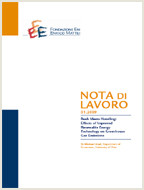Policy- v. Individual Heterogeneity in the Benefits of Climate Change Mitigation: Evidence from a Stated-Preference Survey

13.12.2016
Anna Alberini (University of Maryland, Fondazione Eni Enrico Mattei, Centre for Energy Policy and Economics, ETH Zürich); Milan Scasny (Charles University Environment Center); Andrea Bigano (Fondazione Eni Enrico Mattei, CMCC, Far East Federal University)
Q41, Q48, Q54, Q51
Climate Change Mitigation, WTP per ton of CO2 Emissions Reduced, Choice Experiments
Mitigation, Innovation and Transformation Pathways
Massimo Tavoni
The implementation of decarbonization policies depends crucially on the public’s willingness to pay for them. We use stated preference methods to investigate the public’s preferences for such policies. We ask three research questions. First, does the willingness to pay (WTP) for each ton of CO2 emissions reductions depend on the policies and on individual characteristics of the respondents? Second, how extensive is the variation associated with these factors? Third, what factors affect support for or opposition to a carbon tax? Based on the responses to discrete choice experiments from a sample of Italians, we find that the WTP per ton of CO2 ranges between € 6 and 130, depending on whether the public program is based on taxes, incentives, information-based approaches or standards. Further allowing for individual characteristics of the respondents, such as gender or education, and knowledge of climate change, results in a 300% change in WTP, holding the policy instrument the same. We conclude that the variation associated with the policy instrument is approximately of the same order of magnitude as that associated with individual characteristics of the respondents.
***
Suggested citation: Alberini, A., M. Šcasný, A. Bigano, (2016), ‘Policy- v. Individual Heterogeneity in the Benefits of Climate Change Mitigation: Evidence from a Stated-Preference Survey’, Nota di Lavoro 80.2016, Milan, Italy: Fondazione Eni Enrico Mattei
